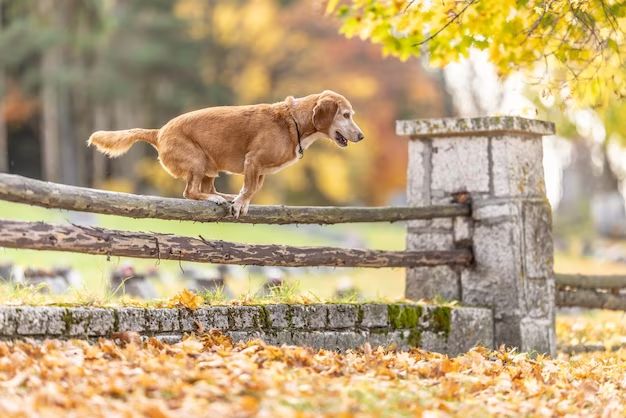Having a dog that constantly jumps on the fence can be frustrating and worrying. Not only is it annoying to hear them hitting the fence over and over, but they could also hurt themselves or damage the fence if they jump with enough force. Luckily, there are some simple techniques you can try to curb this behavior and keep your dog safely in the yard.
Page Contents
Why Do Dogs Jump on the Fence?
There are a few common reasons dogs jump up on the fence:
- They want attention. The motion or noise of hitting the fence often gets a reaction from people, which rewards the behavior.
- They’re excited or playing. Some dogs just enjoy the feeling of jumping up on things when they get riled up.
- They want to escape. Dogs that are bored, under-exercised or have high prey drive may be trying to get out of the yard to run free or chase animals.
- Separation anxiety. Dogs with separation anxiety may jump and claw at the fence when left alone as they try to escape and reunite with their owners.
Determining the specific reason your dog is fence jumping can help you address the behavior more effectively.
Training Your Dog Not to Jump
With consistent training, most dogs can learn not to jump on the fence. Here are some effective techniques:
Remove Rewards
First, stop unintentionally rewarding the behavior by reacting or giving your dog attention when they jump. As hard as it can be, ignore the fence jumping completely. No eye contact, verbal corrections or engagement of any kind. Only give your dog attention when they are calm and have all four paws on the ground.
Interrupt and Redirect
Use an interrupter sound or phrase like “Eh-eh!” or a whistle when you see them preparing to jump. Immediately after you interrupt, redirect their energy by tossing a toy or treat on the ground to reward non-jumping behaviors. Practice this frequently so they learn jumping earns them nothing, while remaining calm earns rewards.
Increase Exercise
Make sure your dog gets adequate physical and mental exercise every day. Tired dogs are less likely to have pent up energy that leads to fence jumping. Take them on longer walks, play fetch in the yard, give interactive puzzle toys or take them to a dog park regularly to help them burn energy in positive ways.
Address Underlying Causes
If your dog seems to jump when left alone or there are specific triggers, anxiety may be a factor. Use calming aids like a Thundershirt when leaving them alone. Ask your vet about anti-anxiety medication if separation anxiety is severe. For excitement-based jumping, remain calm and unfazed by their energy to avoid rewarding the behavior.
Train an Incompatible Behavior
Teaching your dog to sit or lie down and stay when near the fence makes jumping impossible. Reward them heavily for obeying fence-related commands. With time, replace freedom near the fence with periods of structured obedience training instead.
Use Aversives Humanely
If other methods haven’t worked, introducing unpleasant deterrents may stop the jumping. Spray citronella or pet-safe fragrances near the fence so jumping results in an unpleasant odor. Or place smooth rocks or chicken wire along the fence line so it’s no longer comfortable to jump up. Only use physical punishment like prong or shock collars under strict guidance from a trainer.
Preventative Measures
Along with training, some modifications to your fence or yard can also help curb fence jumping:
- Install privacy slats or debris netting on the fence to block views and remove motivation.
- Cover the top of the fence with plastic sheeting, chicken wire or anti-jump spikes.
- Consider adding electric wire along the bottom or top of the fence as a deterrent.
- Plant bushes or hedges along the fence line to eliminate running starts.
- Build a smaller “airlock” area that your dog can use to enter and exit the yard.
When to Get Help
If you’ve tried training and prevention for a few weeks with no success, contact a certified dog trainer or behaviorist. They can observe your dog and situation and develop a customized plan to curb the unwanted behavior. Seeking professional help sooner is better to avoid the problem becoming ingrained.
Conclusion
Fence jumping likely results from boredom, excess energy, anxiety or a desire for attention. Address the root cause through training, exercise and removing rewards for jumping. Interrupt the behavior and give positive reinforcement for four paws on the ground instead. With time and consistency, as well as some prevention measures, most dogs can break the fence jumping habit for good.
